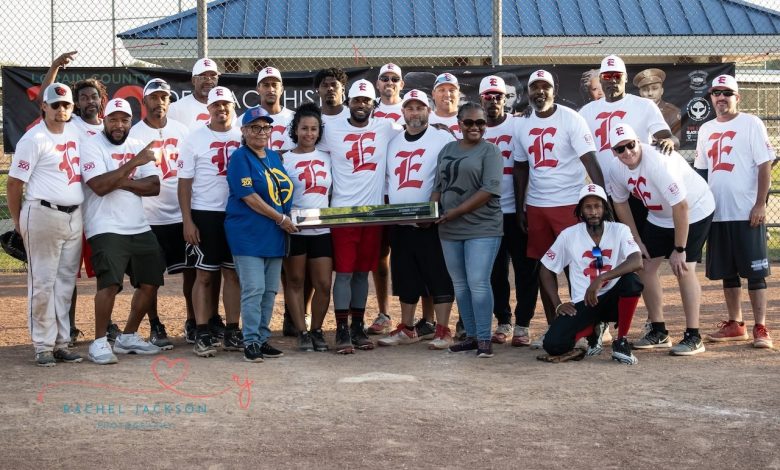How a forgotten piece of Black baseball history in Lorain County is being revived

OBERLIN, Ohio – Long before Jackie Robinson broke Major League Baseball’s color barrier, Lorain County was home to sandlot showdowns that packed parks with cheering families and all-Black ballclubs with names like the Elyria Smart Set and the Lorain Black Diamond.
This weekend, a softball tournament will bring that history back to life — and spotlight the county’s deep Black heritage.
The L.E.O. Black History Alliance Lorain County Softball Tournament, now in its second year, is modeled after the day-long contests of the 1910s, ’20s and ’30s, when entire communities turned out for the games. The best-of-three series between teams from Lorain and Elyria will be paired with a community picnic, free food and drinks, and plenty of hometown pride.
The action begins with a pre-game ceremony at 9:30 a.m. Saturday at Oberlin Recreation Center, followed by a second game at Elyria West Park Softball Complex at 5:30 p.m. that evening. If a deciding game is needed, it will be played at 10 a.m. Sunday back in Oberlin.
It’s the centerpiece of a countywide collaboration among Elyria Black Legacy Connection, the Lorain Black History Project and the Oberlin African-American Genealogy and History Group. Together, they hope to honor a sports tradition that once united neighborhoods while also drawing attention to a wealth of Black history that too often goes overlooked.
“This county is saturated with Black history,” said Ethan West, founder of the Elyria Black Legacy Connection. “This is just one avenue that we can help promote it.”
The tournament is open to everyone, though most of the players suiting up have ties to the Black community in Lorain or Elyria. Organizers say the goal is to carry on a legacy that belongs to the whole county.
“Black history is not just for Black people to know,” said Carrie Isabell of the Oberlin African-American Genealogy and History Group. “Black history is everybody’s history.”
History in clips
Newspaper clippings paint a story of Lorain County’s Black amateur teams.
There were Tuck’s Stars from Oberlin and the Amherst Grays, in addition to Smart Set and Black Diamond. The teams played against one another and competed against local white teams.
The May 9, 1910 issue of the Lorain Chronicle-Telegram announced the formation of the Smart Set under the headline “Colored Players Challenge Teams.”
“The colored base ball players of this city have organized a team which will be known as the ‘Smart Set’ and are willing to play any ball team in this locality Saturday afternoons or Sunday,” the story read.
The games were organized and competitive – and covered by the county’s daily newspaper.
When Smart Set was set to face off against the Lorain Red Skins in the “Colored Championship” game of the 1913 season on Sunday, Sept. 21, the Elyria Evening Telegram reported that “there is much spirit connected with the deciding contest” and “both teams are confident of winning.”
Smart Set took the pennant, winning the rubber match 12-5 behind the “heavy hitting of the locals,” the paper reported.

The teams were made up of Black business owners and laborers. Tuck’s Stars, from Oberlin, was founded by Archibald “Art” Tuck, an Army veteran and businessman.
And the games were more than just contests between two teams. They drew the entire community.
“People stayed at the park all day, until it got dark,” West said. “They really were community events.”
The men who played would spend the day with their wives and children at the ball field, and then get cleaned up and go to one of the local juke joints in Lorain or Elyria to blow off whatever steam they had left.
The games are a little-known part of Lorain County’s vibrant Black history, largely driven by Oberlin College’s status as a hub of emancipation and a stop on the Underground Railroad.
But Oberlin also has its own place in Black baseball history.
Moses Fleetwood “Fleet” Walker, born in Steubenville, was Oberlin College’s baseball team’s starting catcher in its inaugural season in 1881, before the University of Michigan recruited him to finish his collegiate career there.
Walker, who was Black, went on to sign with the Toledo Blue Stockings in the American Association and debuted on May 1, 1884, making him the first openly Black man to play in Major League Baseball – 63 years before Jackie Robinson broke the modern-era color barrier.
West and the other groups saw a chance to tell these stories and more as the county prepared to mark its bicentennial last year.
“The three of us had gotten together and said, ‘Lorain County, we cannot miss the Black presence and the history that Black people had in the building and growing of this county,’” West said.
The groups formed a coalition to tap into each city’s Black history.
Elyria Black Legacy Connection put together presentations on the Great Migration. The Oberlin African-American Genealogy and History Group focused on Oberlin’s early settlers. And the Lorain Black History Project presented on Black social clubs that were popular at the turn of the 20th Century.
The softball tournament was the final piece in the coalition’s plan to mark Black history.
It was West’s idea. He’s a history buff, with a special interest in Black history — in addition to founding the Black Legacy Connection, he has researched his own family. He took his daughter to visit the plantation that enslaved their ancestors.
“It’s a duty for us to learn more about your own family and the journey from your ancestors down to you, because that’s empowerment,” he said. “If you know who you are, no one else can try to tell you who you are.”
The 46-year-old assistant varsity baseball coach at Elyria High School and member of an adult baseball league is also admittedly a “baseball guy.”
But the other groups jumped at the opportunity.
“It’s the very thing that our organization looks for — bringing forth genealogical history, not just in Oberlin, but also being able to focus on Lorain County and to be a vessel to discovering history resources in other places,” Isabell said. “It’s just a perfect fit for us.”
Why play?

For Breanna Stevenson, the chance to play in the games is three-fold.
The 36-year-old still loves – and plays — the game. She played Little League baseball, competing against the boys. She idolized the stars of the 1990s Cleveland Indians and modeled her game after Omar Vizquel. She also plays in adult softball circuits that compete across the region, and she coaches youth softball.
It also offers the chance for Stevenson to act as a role model herself.
“There are very few minorities who play the sport now up here,” Stevenson, who is Black, said. “Younger kids can see us playing as minorities and see that it’s okay to step away from basketball and football and play a different sport like golf or baseball or softball or soccer and just see people who have been doing it who look like them.”
Chris Olejko knows about Lorain County history. His father has his own chapter in it.
Former Lorain Mayor Alex Olejko was never afraid to speak his mind, most famously when he called famed ABC anchor Ted Koppel a “candy ass.” But the elder Olejko was also a standout on the diamond, playing in the military leagues during his service at Pearl Harbor from 1943-1945, and then professionally for a season in Alabama during the height of segregation.
Chris remembers his father telling him of the spectacle of Black sandlot games in Lorain County he watched as a child in the 1930s.
Chris, now 58, inherited a love for baseball from his father. He plays in the Greater Cleveland Adult Baseball League, where, like his father, he has garnered a reputation for both his play and his antics.
But he also inherited his father’s appreciation for other cultures.
Former Plain Dealer columnist Regina Brett once wrote of Olejko, whom she covered for the Lorain Journal, that he never missed an ethnic picnic, parade or event.
“He believed everyone in the city was worthy of his time and attention,” she wrote after he died in 2009. “The greatest insult was to say he didn’t care about someone in Lorain.”
Chris pointed out that the country is at perhaps the most divisive period in decades. For him, the game is a way to bring people of different backgrounds and races together and learn about the county’s Black history.
“It goes to the old saying, ‘those who don’t know the history are bound to repeat it,’” Olejko said. “And it teaches the younger generation about the past. And unfortunately, with the political climate the way it is, it’s starting to go back to that again. We need the younger generation, whether Black, white, Hispanic, to step up and say ‘stop.’”
The black bat trophy

No tournament would be complete without a trophy. In addition to bragging rights, the winning team gets possession of an all black wooden baseball bat that West had custom-made for the tournament.
Its barrel is inscribed with “Historic Black Baseball in Lorain County,” and the winning city gets to keep the bat until the next year’s tournament.
Elyria Smart Set took the tournament last year. The bat has spent the last 12 months on display at Elyria City Hall.
But Lorain’s team has different plans.
“If anyone wants to see the Black Bat after this weekend, they can stop at the Lorain County Historical Society” in Lorain, Chris Olejko said with a smirk.
West laughed before correcting him.
“It’ll be back in [Elyria] City Hall on Monday morning,” he said.
Like their predecessors a century ago, it seems both teams are confident in winning.
If you purchase a product or register for an account through a link on our site, we may receive compensation. By using this site, you consent to our User Agreement and agree that your clicks, interactions, and personal information may be collected, recorded, and/or stored by us and social media and other third-party partners in accordance with our Privacy Policy.




